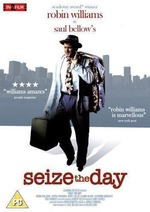Seize the Day (1986)
November 1, 2014 4:14 PM - Subscribe
Salesman Tommy Wilhelm packs up for New York City to try to repair the pieces of his broken life.
Wikipedia summarizes the story of Saul Bellow's book, upon which the film is based:
Peter Rainer ponders why Bellow's work has seldom been adapted for the screen, and concludes that "Bellow is one tough literary nut to crack, and most filmmakers have a difficult enough time with the pistachios and filberts and sunflower seeds that litter the best-seller lists and drugstore paperback carousels."
In the same essay ("Seize the Day: Bellow on Film"), Rainer writes:
Writers: Saul Bellow (novel), Ronald Ribman (screenplay)
Tagline: Losers aren't born, they're made.
Wikipedia summarizes the story of Saul Bellow's book, upon which the film is based:
The story centers around a day in the life of Wilhelm Adler (aka Tommy Wilhelm), a failed actor in his forties. Wilhelm is unemployed, impecunious, separated from his wife (who refuses to agree to a divorce), and estranged from his children and his father. He is also stuck with the same immaturity and lack of insight which has brought him to failure. In Seize the Day Wilhelm experiences a day of reckoning as he is forced to examine his life and to finally accept the "burden of self".Roger Ebert writes in passing in his review for another film: "As early as 'Seize the Day' (1986), a little-seen adaptation of Saul Bellow's novel about a man who loses everything of importance, Williams was accepting roles in which he would be inward, withdrawn, obsessive, peculiar."
Peter Rainer ponders why Bellow's work has seldom been adapted for the screen, and concludes that "Bellow is one tough literary nut to crack, and most filmmakers have a difficult enough time with the pistachios and filberts and sunflower seeds that litter the best-seller lists and drugstore paperback carousels."
In the same essay ("Seize the Day: Bellow on Film"), Rainer writes:
Robin Williams at first seems an odd choice to play Wilhelm; one envisions an aging, husky handsomeness. But, if Williams doesn't have the look for Tommy, he's just right for Wilky; he's brought the inner man, the pained, failed dissimulator, right to the surface. His vulnerabilities are shockingly, comically evident. When Tommy is eating breakfast with his father (a ritual they both abhor), sitting across from the impeccably dressed autocrat, he demeans himself by playing the kid; he lets his voice dip and squeak, as if he were a ventriloquist jamming with his puppet.Bits and bobs:
Throughout the movie, Dr. Adler is, in effect, imploring his son to comfort him for having such a son, and Williams shows us how Tommy is choked by the indignity. (Their scenes together suggest an assimilation comedy as well, with Dr. Adler playing the Jewish usurer to Tommy’s gentile borrower.)
- V. S. Pritchett called Bellow's novella "a small gray masterpiece."
- Themes and styles (Wiki) is worth a look.
- Bellow won the Nobel Prize for literature in 1976.
- Actor Steve Vinovich is in another Robin Williams film: Awakenings (1990).
- Saul Bellow has a cameo in the film as 'Man in Hallway'.
- This was the final film of actress Jo Van Fleet; she won an Academy Award for Best Supporting Actress for her work in her film debut East of Eden.
- "Coincidentally, lead Robin Williams went on to star in Dead Poets Society (1989) in which, as a teacher, he extolled the proverb – 'carpe diem' – Latin for 'seize the day.'" (imdb)
Writers: Saul Bellow (novel), Ronald Ribman (screenplay)
Tagline: Losers aren't born, they're made.
You are not logged in, either login or create an account to post comments

I'm just not that into this one, I'm afraid -- here are some thoughts:
- This is difficult to obtain - I could not find it and my local public library, nor through intra-library loan; it was available on Netflix but there was a wait for it; finally I received it and found that the video transfer appalling, making it almost unwatchable.
- In addition to the poor video, the audio is atrocious.
- ....aaaand the production values are very low (hair, makeup - even allowing for the advances in these areas since the time of production). So you have three strikes against this adaptation, and three things that interfere with enjoying and focusing on the story.
- However, there _is_ Robin Williams and he does not phone it in here (nor does he ever). There is pain, suffering, alienation, anger, resentment, love, melancholy, drunken crazed ramblings, and more. So if you're into Robin doing all sorts of things, check it out.
- Confession time: I tried to read Saul Bellow (it might've been "Seize the Day") when I was 13 or 14 and found it remorselessly bleak and depressing; I also didn't find the atmosphere of the book to be redeemed by other aspects, say, the quality of the writing. So I came to this movie already not that interested in Bellow's worldview.
I found the shallowness and limited nature of the character of the father, and the scenes between the father and Williams' character, particularly hard to stomach.But I'd love to hear what others think - particularly those who *do* appreciate Saul Bellow. Was this a good adaptation? Why? And is Robin Williams a good fit for the role?
posted by joseph conrad is fully awesome at 5:10 PM on November 17, 2014